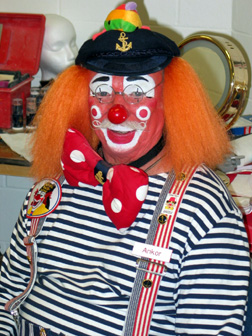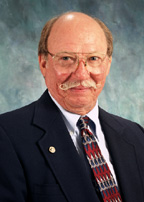 |
 |
But, to 5-year-olds at the Shrine Circus he’s Ankor, the clown with the fiery orange hair, handlebar mustache and a pet lobster on his hand.
“You really have to enjoy the kids to be a clown,” said Dr. Turpen, one of 70 clowns in the area’s Tangier Shrine Clown Patrol. “Once you’ve got your makeup on there’s no relief. People honk and wave at you and kids come up and hug you.”
For the past 10 years, Dr. Turpen, a professor in UNMC’s Genetics, Cell Biology and Anatomy, has entertained children at the annual four-day Tangier Shrine Circus by signing autographs, introducing kids to the fish on his hat and clowning around with fellow clowns.
Between 12 and 15 times each year, Dr. Turpen transforms into Ankor the clown, complete with red suspenders, an oversized polka-dotted bow tie and blue high top sneakers, to make special appearances at parades, benefits and hospitals.
“You get to meet some really special children during the year and bring a smile to their face,” said Dr. Turpen, a third-generation Shriner. “You see some heartbreaking things and then you see that sparkle in their eyes..”
During last week’s visit to University Tower, Ankor met a young boy with leukemia who worried that “it hurts when those guys step on his big feet.”
 |
Ankor the clown, second from right, with his friends. |
Clowning is more than wearing a silly costume and a red nose. “As a clown, you’ve got to be willing to be creative, laugh at yourself and act stupid,” Dr. Turpen said.
What he wasn’t able to do, he said, was shave his trademark moustache. So, he chose a nautical theme and became a character clown, which, next to the hobo clown, is the only type of clown allowed to sport facial hair.
Dr. Turpen also had to adjust to the two-hour transformation of becoming Ankor, the bulk of the time spent covering his face with red, white and black grease paint. But once Ankor emerges, he’s bent on entertaining children with silly jokes, hearty laughs and outlandish skits.
“A lot of what we do has to be spontaneous,” Dr. Turpen said.
The rest is learned at Clown College, which is where the Shrine clowns develop their characters, take clown ethics courses and learn appropriate behavior for a clown. It’s taboo, Dr. Turpen said, for clowns in makeup to smoke or initiate touch.
After the circus curtain falls on a 15-hour day, a bottle of Baby Oil wipes away Ankor’s dimples until the next performance and Dr. Turpen returns to UNMC, where he joined the faculty in 1983, to teach students and serve as the principal investigator on a five-year grant totaling almost $17 million from the National Institutes of Health. The grant — the largest grant in history received by UNMC — is to build a statewide biomedical research infrastructure among undergraduate and graduate institutions.
The Denver native says his unique past-time fits well with his role as a teacher because he’s comfortable being in front of a large crowd and, in jest, tells his students: “Tell your mom your professor is a clown.”
“I find some humor in everything,” he said.
Including the fact that when the circus ends, and Ankor disappears, nobody notices Dr. Turpen walking to his car.